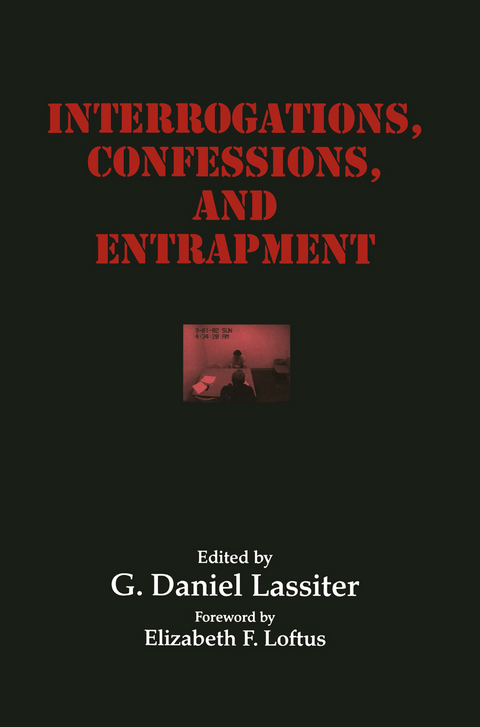
Interrogations, Confessions, and Entrapment
Springer-Verlag New York Inc.
978-0-387-33151-5 (ISBN)
Coerced confessions have long been a staple of TV crime dramas, and have also been the subject of recent news stories. The complexity of such situations, however, is rarely explored even in the scientific literature.
Now in softcover, Interrogations, Confessions, and Entrapment remains one of the best syntheses of the scientific, legal, and ethical findings in this area, uncovering subtle yet powerful forces that often compromise the integrity of the criminal justice system. Editor G. Daniel Lassiter identifies the exposure of psychological coercion as an emerging frontier in legal psychology, citing its roots in the "third degree" approach of former times, and noting that its techniques carry little scientific validity. A team of psychologists, criminologists, and legal scholars asks—and goes a long way toward answering—important questions such as:
-What forms of psychological coercion are involved in interrogation?
-Are some people more susceptible to falsely confessing than others?
-What are the effects of psychological manipulation on innocent suspects?
-Are coercive tactics ever justified with minors?
-Can jurors recognize psychological coercion and unreliable confessions?
-Can entrapment techniques encourage people to commit crimes?
-What steps can law enforcement take to minimize coercion?
Throughout this progressive volume, readers will find important research-based ideas for educating the courts, changing policy, and implementing reform, from improving police interrogation skills to better methods of evaluating confession evidence. For the expert witness, legal consultant, or student of forensic psychology, this is material whose relevance will only increase with time.
G. Daniel Lassiter is Professor of Psychology at Ohio University. He received his Ph.D. from the University of Virginia in 1984 and thereafter began a two-year Postdoctoral Fellowship at Northwestern University. He was a Visiting Faculty at the University of Florida before arriving at Ohio University in 1987.
1: Exposing Coercive Influences in the Criminal Justice System: An Agenda for Legal Psychology in the Twenty-First Century.- 2: Questions.- 3: The Third Degree and the Origins of Psychological Interrogation in the United States.- 4: “You’re Guilty, So Just Confess!” Cognitive and Behavioral Confirmation Biases in the Interrogation Room.- 5: The Police Interrogation of Children and Adolescents.- 6: Tales From the Juvenile Confession Front: A Guide to How Standard Police Interrogation Tactics Can Produce Coerced and False Confessions from Juvenile Suspects.- 7: Mental Retardation, Competency to Waive Miranda Rights, and False Confessions.- 8: Attempts to Improve the Police Interviewing of Suspects.- 9: Bias and Accuracy in the Evaluation of Confession Evidence.- 10: The Psychology of Entrapment.- 11: Expert Psychological Testimony on the Psychology of Interrogations and Confessions.- 12: So What’s a Concerned Psychologist to Do? Translating the Research on Interrogations, Confessions, and Entrapment into Policy.
| Reihe/Serie | Perspectives in Law & Psychology ; 20 |
|---|---|
| Zusatzinfo | XX, 290 p. |
| Verlagsort | New York, NY |
| Sprache | englisch |
| Maße | 155 x 235 mm |
| Themenwelt | Geisteswissenschaften ► Psychologie ► Allgemeines / Lexika |
| Geisteswissenschaften ► Psychologie ► Klinische Psychologie | |
| Medizin / Pharmazie ► Medizinische Fachgebiete ► Psychiatrie / Psychotherapie | |
| Recht / Steuern ► Strafrecht ► Kriminologie | |
| ISBN-10 | 0-387-33151-4 / 0387331514 |
| ISBN-13 | 978-0-387-33151-5 / 9780387331515 |
| Zustand | Neuware |
| Haben Sie eine Frage zum Produkt? |
aus dem Bereich


